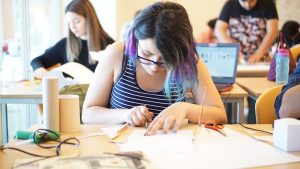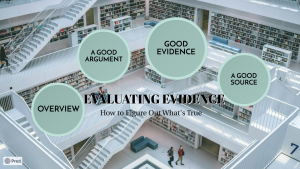35 Evaluating Evidence
Learning Objectives
-
Practice skills in evaluating evidence relevant to Science and Social Studies texts.
-
Evaluate arguments in a text, including the validity of the reasoning, and the relevance and sufficiency of the evidence.
Chapter & Discussion
This chapter includes a presentation that can be navigated in a classroom setting or independently. You can access the presentation via the link below.
Reading for Science & Social Studies: Evaluating Evidence
Work through the different sections of the chapter and discuss ideas and topics as they arise. If you’re working independently, take notes instead. Notes and active discussion will be helpful in navigating this week’s assignments.
Overview
The GED Reading, Science, and Social Studies tests all have elements where they ask you to evaluate claims and evidence.
- This means looking at articles and determining:
- Whether the author makes a good argument
- Whether the author backs up their argument with good evidence
- Whether you can trust the person who wrote it
Today, we’ll look at these elements and practice skills for evaluating them.

A Good Argument
The first thing you’ll need to figure out is whether the author makes a good argument. The first step is to read it carefully and be able to say what the main idea is. Next, decide if it meets the following criteria.
A good argument:
- Appeals to logic instead of emotions.
- Relies on facts rather than opinions.
- Is clear to the reader. We don’t have to work hard to figure it out.
- Is well organized. The author made it easy to digest and didn’t include unnecessary information.
- Has evidence for everything it claims.
Good Evidence
The next thing you need to do is determine if an article uses good evidence. Here are some criteria.
Good evidence:
- Comes from primary sources (who were there) rather than secondary sources (who were not).
- Comes from peer-reviewed studies from trusted universities and colleges.
- Is easy to fact-check.
- Tells you where it got the information.
- Does not rely on opinions.

A Good Source
The last step towards evaluating a case is to look at the person presenting it. There are a few things you’re looking for here.
- Is this person an expert on the topic? Do they have good credentials to speak on this topic?
- Is the institution they come from trustworthy? This could be their university or their publisher. Any reason not to trust that organization?
- Is there any reason this person might have bias? Do their claims benefit them personally in any way?
Assigned Reading
Here are this week’s readings. Additionally, please read for your own personal enjoyment for 1/2 hour each day. This will be called your “Reading Zone” reading and it will coincide with many upcoming activities.
Evaluating Evidence by John Green (via Crash Course)
Assignment: Lateral Reading (250 Words)
Go to Google News and search for the term “Opinion.” Find an article that you think could potentially be fact-checked. Then, answer the following prompts:
-
Do some lateral reading on the author. Who are they? Are they an expert in their field? Are they connected to an institution that lends credibility?
-
What is their opinion? Can you think of a way that they stand to gain from offering this opinion?
Assignment: Reading Zone Response (250 Words)
For Reading Zone, you must find a novel that is interesting to you and enjoyable to read. If you need help finding a Reading Zone book, please ask. Please read your Reading Zone book for a half-hour each day. On class days, there will be time in class dedicated to reading.
Create a two-paragraph response to the reading you did this week. The first paragraph should summarize what you read this week. The second paragraph should address the following prompt:
How would you describe this author’s writing style? What do they focus on? What are some of their goals as a writer?
Attribution
Green, J. (2019). Evaluating Evidence: Crash Course Navigating Digital Information #6. Crash Course.


